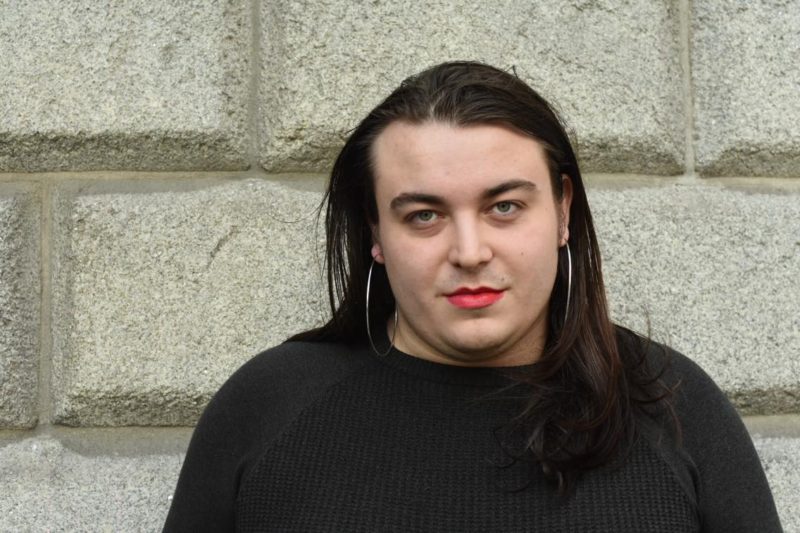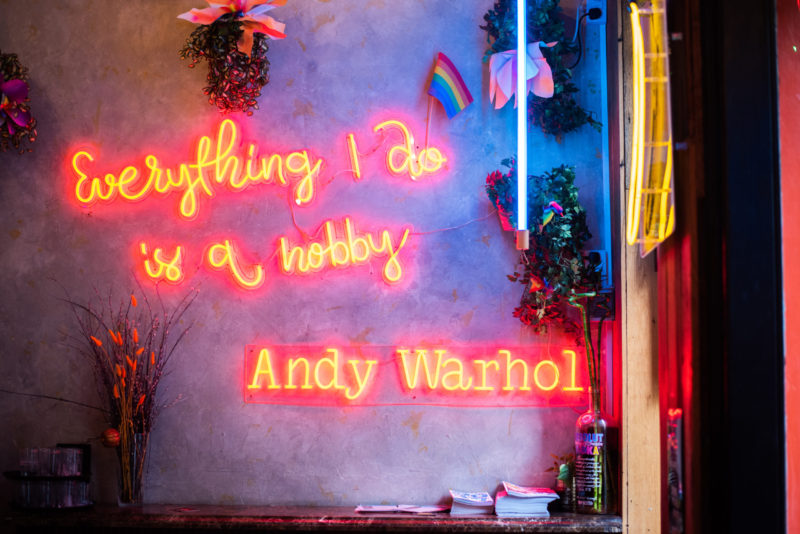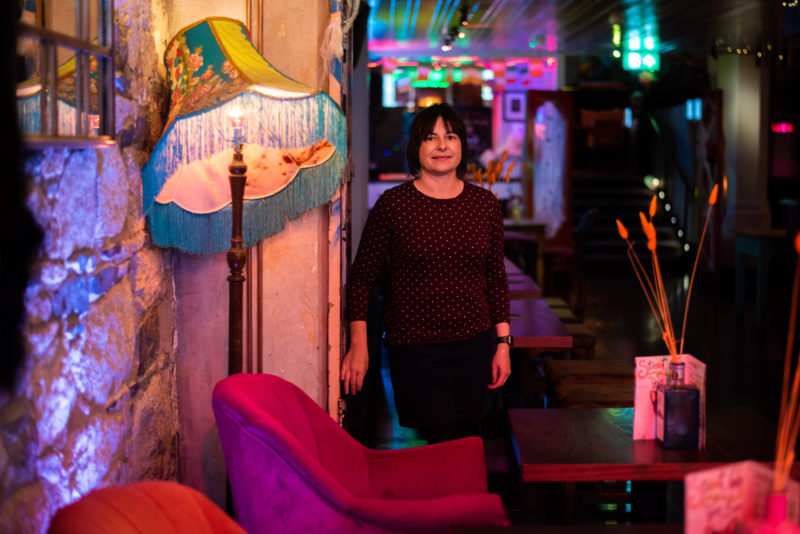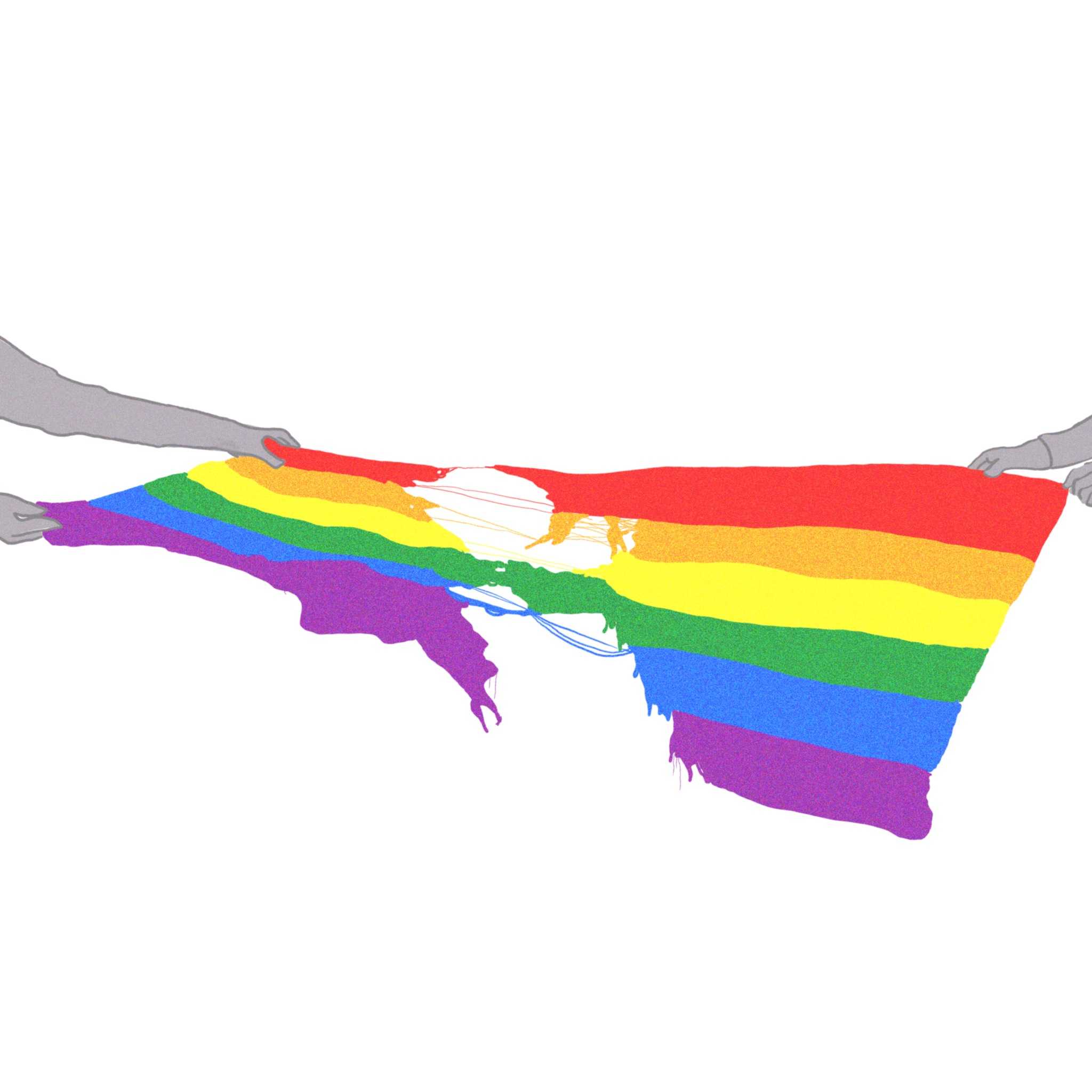When Sé Ó hEidhin stepped in front of the bouncer outside Dublin’s premier LGBTQ+ nightclub, the George, wearing shorts and fishnet stockings, she was promptly turned away. “Cis[gendered] girls were definitely inside wearing the same thing”, she says.
Ó hEidhin identifies as a bisexual, non-binary trans woman. Like many trans individuals in Dublin, she has experienced intolerance from within the very community one would expect to staunchly advocate for her rights. Especially evident in the queer nightlife scene, emerging divisions amongst the distinct facets of the LGBTQ+ community have prompted action and outcry, most recently in the form of alternative Pride marches to highlight the specific needs of trans and non-binary members.
Leaps and bounds have been made in Ireland’s attitude towards those who identify as members of the LGBTQ+ community in recent decades. An early version of the Dublin Pride parade began in the 1970s, with the first large-scale protest march taking place in March 1983. While it began as a grassroots movement to protest the criminalisation of homosexuality, the Pride parade blossomed into one of the most popular events in Ireland.
And yet, more than 30 years since its conception, the expansion of Pride in Dublin, coupled with the inevitable commercialisation of its cause, has brought into question the more profound intention behind the concept of LGBTQ+ support. This year’s Pride parade in June revealed latent disquiet within the queer community, made evident by the amplified call for alternative marches. Many supported the aim to draw specific attention to trans rights and to voice a set of needs independent of those proclaimed by the gay community.
The push for alternative marches was largely a response to the co-opting of the rights and struggles of LGBTQ+ people by big businesses and corporations. Dublin’s “Pride Guide” (located on the Pride Parade’s official website) features rainbow cartoon advertisements for “sponsors” like Tesco, Aer Lingus, Google and other major corporate brand names.
Alternative Pride marches stood both as a challenge to normal service and a symptom of a community wrestling with its own identity
The Alternative Pride marches stood as both a challenge to what has been characterised as a corporatised, pinkwashed affair and a symptom of a community wrestling with its own identity. The presence of uniformed Gardaí at the parade also proved an unsettling addition for some to what was once a protest against the abuses of police officers.
The seams, then, that once united a closely interwoven movement are fraying, creating a divergence between the social and political demands of cisgendered gay people and trans and non-binary people.
As such, it has become necessary to form distinctions between sexual orientation and gender. The issues concerning trans and non-binary members are not always congruent with those of gay, lesbian, bisexual, or pansexual members. For a long time, the term LGBTQ+ represented a fight for universal recognition, a reassuring nod from the rest of society affirming that all those under the umbrella were still valued and deserving of rights. In many places, these remain the fundamental objectives of the movement, but in Dublin, the struggle has evolved, become nuanced, won rights and moved onto the next fight.
It doesn’t make much sense anymore to put every queer person into the same category, just as it is not good enough to be a supporter of the quest for liberation in one’s sexual orientation but hesitant about getting on board with people’s differing gender expressions. The battle lines have moved, perhaps, but if everyone under the LGBTQ+ is entitled to the same human rights, then it’s hardly any surprise that some trans people feel a separate fight for their rights is warranted amid the celebratory noises of Dublin’s mainstream Pride.

Sé Ó hEidhin identifies as a bisexual, non-binary trans woman.
Student Hassan Ali, who identifies as nonbinary and uses they/them pronouns, explains the necessity of differentiating between sexuality and gender. “I do think there are a lot of cisgender people in the community who are ignorant about the trans community, and a lot of stigma around being gender non-conforming or transgender exists within the queer community too.”
Just as she mentioned being refused entry into the George simply for dressing in accordance with her gender, Ó hEidhin said she has had bouncers reject her at the door because she is not wearing makeup in her ID, “and they act like it’s obviously not the same person”.
If Dublin’s oldest gay nightclub – and self-proclaimed “Heart of LGBT Ireland” – is not an inclusive and welcoming environnment for those outside the cisgender binary, then where in Dublin can non-binary and trans members of the LGBTQ+ community find acceptance?
Nathan O’Gara uses he/they pronouns and identifies as nonbinary. In an email to The University Times, he underlines the importance of an inclusive nightlife scene for the LGBTQ+ community, citing gay bars and clubs as the first places that allow some people to express themselves authentically. However, he’s aware of the areas in which these spaces have failed the trans and gender non-comforming members of the community.
In Dublin, the struggle for LGBTQ+ rights has evolved, become nuanced, won rights and moved onto the next fight
“Efforts”, he writes, “need to be made to educate staff on transgender identities. Bouncers frequently refuse trans people entry when their presentation doesn’t match what is on their ID, even when explanation can be given – a refusal that can often be done maliciously when trans people are refused but cis drag performers are allowed in, despite having the same non-matching ID issue. Many trans people have had negative experiences in the George in particular, where staff have followed them into the toilets and demanded to see their ID to see if their legal gender matches the bathroom being used”.
The University Times spoke to Sophie McDonald, the general manager of the George, about O’Gara and Ó hEidhin’s comments. She said: “We have transgender staff. Our security would know and be friends with these people, so they know IDs and things won’t always match people’s specific appearances. The only time that’s ever an issue is when the IDs are completely different, and it’s just for security purposes that we have to make sure it’s not a fake ID.”
The George, she says, “would always have had a very inclusive policy here. From the minute the doors opened over 35 years ago, we would always have been very inclusive of anybody. Our aim was to have a space so that anybody could come in and be who they wanted to be once they stepped past those doors. That was obviously super, super important before equal marriage was passed in the last 15 years, at a time when society was a lot less open to those kind of things. I’ve memories of customers coming in 10 or 12 years ago – when I was still a bartender – and coming up to the bar and asking: ‘Oh, is it okay if I get changed into women’s clothes?’ The answer was always yes of course, as long as it’s within the realms of decency”.
McDonald says that “more can be done” on trans rights in general. “I think it is an issue that has really come to the forefront and I think a lot of education has gone on in the last 18 months to two years alone about it, which has just really opened up people’s eyes to what people are going through, and to what trans people are going through with the struggle that it is. It’s heartbreaking. I couldn’t imagine going through that. I don’t understand people who say it’s a choice or that it’s made up – why would people put themselves through that? I would hope that we are inclusive. Obviously we do have male and female toilets, but we do have a toilet downstairs that is gender-fluid. So, if people are not comfortable using either of those toilets upstairs, they can use that bathroom. We do have all the options there.”
But according to O’Gara, the most popular gay bars, including the George and Pantibar, need to think harder about how to best accomodate the needs of transgender people in relation to the accessibility of gender-neutral bathrooms – “particularly where fear of transphobic violence increases as people are drinking,” says O’Gara.
He adds that even the handicap accessible/gender-neutral toilet in Street 66 – another well-known Dublin gay bar – is inside the women’s toilet, adding a layer of discomfort that could be avoided by providing an entirely separate bathroom.

Ó hEidhin believes an obstacle to greater harmony in the LGBTQ+ community exists among some of its members. Some, she says, have already successfully integrated themselves into society at large and cut themselves adrift from other more marginalised groups yet to make that leap.
This disconnect has meant that some of those who have already secured their rights now neglect the urgent need for a bold campaign to ensure an equivalent social acceptance is extended to its trans and non-binary fringes. “I personally wouldn’t go to main Pride anymore”, says Ó hEidhin, “because if you’re an [assigned male at birth] person wearing makeup, people will think you’re a drag queen. In addition, the corporatisation of Pride is a big problem for most of the trans people I know, particularly when our healthcare is still so poor and when we still have issues in clubs, which are supposed to be safe spaces”.
Dublin’s LGBTQ+ nightlife scene is growing rapidly, ostensibly with the aim of creating a more inclusive environment in which queer-identifying individuals can comfortably enjoy a night out. The desire for social institutions like this is not an indulgence – it’s borne of necessity. Creating clubs explicitly advertised as a safe haven for trans or gender-fluid people is of prime importance when the city’s traditional “gay bars” are seemingly failing to do so.
Ó hEidhin says the atmosphere of these bars and nightclubs inevitably shifts when they become populated by cisgendered heterosexual people, even when they attend as allies. Because gay and trans people have often encountered violence and prejudice in nightclubs, the spaces that label themselves as LGBTQ+ venues are meant to serve as a safe alternative, where individuals of any gender or sexual orientation will be welcomed. The extent, then, to which trans and non-binary people feel welcome in these clubs is by some measures an integral factor in assessing a venue’s success.
Grace Club, located on Arran Quay, opened in February of this year with the intention of creating a techno scene for queer individuals to safely be themselves without judgement. Its mission statement explicitly declares: “No homophobia, transphobia, femmephobia, racism or bigotry of any kind will be tolerated at Grace.”
I do not know a single trans person who has not experienced problems at least once when entering some of the larger LGBTQ+ venues in Dublin
The more traditional gay institutions, including the George and Pantibar, come up repeatedly as places where gender non-comforming individuals meet intolerance, particularly from bouncers. Ó hEidhin says she has also seen a friend thrown out of Pantibar when people were calling them a name that did not correspond with what was printed on their ID. The bouncers, she says, argued that it was “‘obviously a fake ID if they weren’t using their legal name”.
Éanna Ó Séaghdha, a non-binary student who identifies with he/they pronouns, says: “I do not know a single trans person who has not experienced problems with bathrooms or ID at least once when entering some of the larger LGBTQ+ venues in Dublin.”
Like Ó hEidhin, Ó Séaghdha has had deeply uncomfortable experiences at the George with security personnel. “A member of security followed me into the men’s bathroom, waited outside the stall while I used the bathroom and then demanded I show him ID to prove I was male when I came out.”
Bouncers serve as the first point of contact for club-goers on a given night out. To be greeted with disrespect, irrespective of whether the venue advertises itself as being a queer-friendly space, can leave a sour taste for those who identify as trans or outside of the gender binary. Many have argued that even venues that label themselves LGBTQ+ friendly need to be more radical in their attempts to create a safe space for all queer people.
Spinster and Grace Club are two clubs that feature monthly event nights that change venues each time. Wherever they’re on, these nights switch the bathroom signs to be gender neutral. It’s a small gesture, but it can help relieve anxiety. These club nights also normally have policies included in their event descriptions prohibiting transphobia (in addition to misogyny, homophobia, racism and other forms of discrimination), which can provide a reassurance to club-goers that the organisers are making an effort to be inclusive.

Siobhan Conmy, the co-owner of LGBTQ+ bar Street 66, says she didn’t want “old-school, hard, heavy-handed security” on the door of her pub.
Siobhan Conmy is the co-owner of LGBTQ+ bar and music venue Street 66 in Temple Bar. The bar, which she owns alongside Christina Llarena, opened in 2016 and specialises in live music that features local DJs from the community. Conmy says that community involvement is a large component of the venue’s effort to be more inclusive. Since its conception, the bar has supported numerous charities and raised funds for local gay football and hockey teams, as well as Dublin’s biggest gay magazine, Gay Community News.
Conmy says the door security at Street 66 act more like hosts than anything else, and that this is thanks largely to the sense of community they’ve fostered. “We have at least 500 regular customers, and I would know 99.9% of [them] coming in the door.”
The place operates on a much more intimate level, as the head of security is Llarena’s partner.
Having worked in bars for the past 30 years, Conmy had a clear vision of the kind of community-based ethos with which she wanted to infuse Street 66, and that starts with the person at the front door. “I don’t really like the old-school, hard, heavy-handed security … they’re just there in case something happens.”
Conmy is gay herself and, coming from the rural west of Ireland, she knew she wanted to recreate the ambience of the local pubs she knew well, but with the metropolitan inclusivity of an LGBTQ+ bar. She notes the variety among the admittedly limited number of LGBTQ+ nightlife venues. Pantibar caters more to males, while the George markets itself to those after a more intense clubbing experience.
“In Street 66 everyone knows what to expect, everyone talks to everyone and everybody knows everybody”, she says. “We play 80’s music and everybody sings along. It’s a really good vibe.”
If the testimonies of the people I speak to are anything to go by, Dublin is clearly in need of more places like this. And if the alternative Pride parades are any indication of how the trans and gender non-conforming factions of Dublin’s LGBTQ+ community feel about their inclusion at present, changes will have to be made from within. Maybe the umbrella term of “LGBT”, encompassing both sexuality and gender, is no longer an adequate label for the vast diversity it represents.
Ó hEidhin sums up the push for alternative pride parades, and perhaps the greater need for more inclusive nightlife spaces, aptly: “I think it’s more of a symptom of the actual problem, which is that some LGBT people feel like they have their rights, and that pride, clubs, etc. should be a party. Whereas trans people, queer women, etc, are still currently fighting for our rights, and it causes conflict.”
Ali voices a similar sentiment, highlighting the added difficulties trans people undergo in transitioning. “I definitely do think the problem is people both gay and straight link sexuality with gender and we need to work on teaching people that they are two different things, and that struggling with gender is a different thing.”
Perhaps the best way to resolve this conflict, then, is for the LGBTQ+ community as a whole to awaken a new sense of togetherness, and to remind itself that victories in gaining rights and social acceptance are pyrrhic unless the spoils can be shared equally by all in its ranks.







